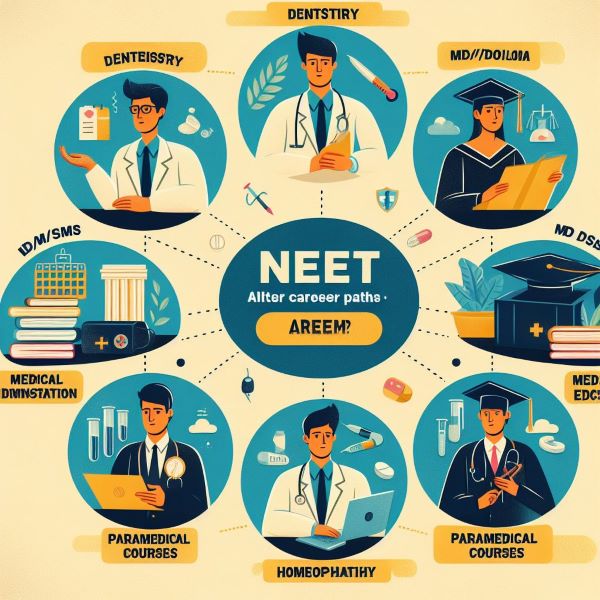The National Eligibility and Entrance Test, or NEET test, provides access to a multitude of job options in the medical and healthcare industries in addition to allowing one to pursue a Bachelor of Medicine, Bachelor of Surgery (MBBS) degree. NEET-qualified people have access to a variety of professions that can be tailored to their interests, abilities, and goals in addition to the conventional MBBS route. The purpose of this article is to provide information about alternate job pathways that are available to NEET students. It does this by emphasizing non-MBBS programs, specialized fields, and new prospects that present gratifying and meaningful career paths.

Bachelor of Dental Surgery (BDS)
Dental healthcare, which emphasizes oral health and hygiene, is an essential part of the medical industry. A Bachelor of Dental Surgery (BDS) degree enables people to work as dentists, identifying and treating dental problems, carrying out procedures, and encouraging oral health. Dentists with specialties in periodontics, orthodontics, or oral surgery can find employment in community health centers, hospitals, or private clinics.
Bachelor of Ayurvedic Medicine and Surgery (BAMS)
The ancient Indian medical system known as Ayurveda places a strong emphasis on natural medicines and holistic health. Individuals can acquire understanding of Ayurvedic principles and practices by earning a Bachelor of Ayurvedic Medicine and Surgery (BAMS) degree. Practitioners of Ayurveda diagnose diseases, recommend herbal remedies, and advocate for preventive healthcare. They might open their own clinics or work in wellness centers or Ayurvedic hospitals.
Bachelor of Homeopathic Medicine and Surgery (BHMS)
An other method of providing healthcare is through homeopathy, which emphasizes customized therapy according to the idea that “like cures like.” One can become a homeopathic doctor by pursuing a Bachelor of Homeopathic Medicine and Surgery (BHMS) degree. Homeopaths use extremely diluted remedies to diagnose and cure a wide range of illnesses. They can provide comprehensive healthcare solutions in clinics, hospitals, or research facilities.
Bachelor of Veterinary Science and Animal Husbandry (BVSc & AH)
Veterinary care is vital to the wellbeing and health of animals. Those who pursue a Bachelor of Veterinary Science and Animal Husbandry (BVSc & AH) degree are better equipped to work as veterinarians, treating patients, performing operations, and advocating for animal welfare. Veterinarians can work at academic institutions, government organizations, animal hospitals, and veterinary clinics.
Bachelor of Physiotherapy (BPT)
Restoring movement and function to those who have been impacted by disease, injury, or disability is the main goal of physiotherapy. Those who pursue a Bachelor of Physiotherapy (BPT) degree will be able to use exercises, manual therapy, and rehabilitation techniques to examine, diagnose, and treat musculoskeletal and neurological disorders. Physiotherapists might work as independent contractors or at medical facilities, sports clinics, and rehabilitation centers.
Bachelor of Occupational Therapy (BOT)
The goal of occupational therapy is to help people become more capable of carrying out everyday tasks and engaging in fulfilling careers. A Bachelor of Occupational Therapy (BOT) degree prepares graduates to evaluate the functional capacities of their clients, create intervention strategies, and assist them in performing activities of daily living. Occupational therapists can help people of all ages in community settings, schools, mental health centers, and hospitals.
Bachelor of Pharmacy (BPharm)
Pharmacy is a dynamic field that includes patient counseling, pharmaceutical management, and advocacy for healthcare. A Bachelor of Pharmacy (BPharm) degree allows one to work as a pharmacist, distributing prescription drugs, counseling patients on drug use, and monitoring the safety of medications. Pharmacists can find employment in pharmaceutical corporations, hospitals, retail pharmacies, regulatory bodies, and research labs.
Biomedical Engineering and Technology
Innovative healthcare solutions are developed through the integration of engineering and biological principles in biomedical engineering. Obtaining a degree in Biomedical Engineering or Biotechnology provides access to design opportunities for therapeutic systems, diagnostic instruments, and medical equipment. Biomedical engineers can contribute to the development of healthcare technology by working for medical device manufacturers, universities, hospitals, or research facilities.
Conclusion
Beyond the traditional MBBS route, the NEET test opens up a plethora of employment options in the medical and healthcare industries. Alternative degrees including BDS, BAMS, BHMS, BVSc & AH, BPT, BOT, BPharm, and newly developing professions like biomedical engineering can help people discover meaningful and influential employment that fit their goals and interests. Aspiring NEETs must investigate these various career paths, think about their own objectives and moral principles, and make well-informed judgments about their future in the rapidly changing healthcare industry.

